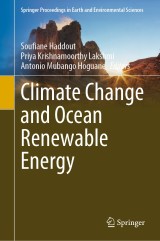Details

Climate Change and Ocean Renewable Energy
Springer Proceedings in Earth and Environmental Sciences
|
CHF 271.50 |
|
| Verlag: | Springer |
| Format: | |
| Veröffentl.: | 15.02.2023 |
| ISBN/EAN: | 9783031269677 |
| Sprache: | englisch |
Dieses eBook enthält ein Wasserzeichen.
Beschreibungen
<p>Renewable-energy is energy that is collected from renewable resources that are naturally replenished on a human timescale. Renewable-energy includes sources such as sunlight, tides, waves, wind, rain, and geothermal heat. According to BP's-2018 Energy Outlook (EO), renewable energy will be the fastest growing source of energy, increasing fivefold by 2040 thus providing around 14% of global primary energy at this future point. On the other hand, climate change is bringing about rising temperatures, which have significant negative impacts on humans and the environment, and transitioning to renewable energy sources, such as biofuels, can help meet this challenge. Transitioning to renewable energy, and reducing reliance on fossil fuels, is one way to help slow down the effects of climate change. While renewables used to be a more expensive option, new clean energy technologies are lowering costs and helping to move economies away from fossil fuels. The 1st International Conferenceon Climate Change and Ocean Renewable Energy (CCORE 2022), is a virtual conference held from November 4-7, 2022, presenting experiences and ideas through research talks and presentations from diverse fields in climate change and ocean renewable energy. This event offers a platform in bringing together a forum for students, postdocs and established scientists to exchange their ideas and contribute to an integrative approach to climate change and ocean renewable energy. <br></p>
Zero Carbon Emission Based Electrical Power Plant by Harvesting Oceanic Wave Energy: Minimization of Environmental Impact in Bangladesh.- The Effect of Air Density in Offshore Wind Power Potential in India.- Influence of Vertical Plates on the Pitching Motion of a SPAR Wind Floater in Waves.- Developing a Decision Support System for a Pumped Storage Hybrid Power Plant.- A SWOT Analysis for Offshore Wind Energy Development: Turkey case.- The Combined Effects of Channel Amplitude and Fluid Elasticity on Viscoelastic Fluid Flow Through A Periodic Channel.<p></p>
<b>K.L.Priya</b> is an Assistant Professor in the Department of Civil Engineering, TKM College of Engineering, Kollam, India. Her research interests include estuarine hydrodynamics, estuarine sediment dynamics, trace metal partitioning, contaminant transport through porous media and groundwater quality modelling.<p><b>A. M. Hoguane</b> is a Professor of Physical Oceanography and Director of the Marine Research and Technology Centre-CePTMar at the Eduardo Mondlane University, Quelimane, Mozambique, his research interest are coastal, estuarine and shelf seas hydrodynamics and water quality; waves and coastal currents; river runoff and coastal water productivity; applied oceanography to fish distribution and availability; integrated coastal zone management; alternative energy sources from the sea.<br></p>
<p><b>S. Haddout</b> is researcher in fluid mechanics and modeling in the Department of Physics, Faculty of Science, Ibn tofail University, Morocco. His recent research interests concern the Environmental Fluid Mechanics; Hydrodynamic Modeling of Estuaries; Hydraulic modeling; Numerical Modeling; Analytical modeling; Transport modeling; Water managements; Limnology and oceanography; and Optimization methods. <br></p>
<p><b>S. Haddout</b> is researcher in fluid mechanics and modeling in the Department of Physics, Faculty of Science, Ibn tofail University, Morocco. His recent research interests concern the Environmental Fluid Mechanics; Hydrodynamic Modeling of Estuaries; Hydraulic modeling; Numerical Modeling; Analytical modeling; Transport modeling; Water managements; Limnology and oceanography; and Optimization methods. <br></p>
<p>Renewable-energy is energy that is collected from renewable resources that are naturally replenished on a human timescale. Renewable-energy includes sources such as sunlight, tides, waves, wind, rain, and geothermal heat. According to BP's-2018 Energy Outlook (EO), renewable energy will be the fastest growing source of energy, increasing fivefold by 2040 thus providing around 14% of global primary energy at this future point. On the other hand, climate change is bringing about rising temperatures, which have significant negative impacts on humans and the environment, and transitioning to renewable energy sources, such as biofuels, can help meet this challenge. Transitioning to renewable energy, and reducing reliance on fossil fuels, is one way to help slow down the effects of climate change. While renewables used to be a more expensive option, new clean energy technologies are lowering costs and helping to move economies away from fossil fuels. The 1st International Conferenceon Climate Change and Ocean Renewable Energy (CCORE 2022), is a virtual conference held from November 4-7, 2022, presenting experiences and ideas through research talks and presentations from diverse fields in climate change and ocean renewable energy. This event offers a platform in bringing together a forum for students, postdocs and established scientists to exchange their ideas and contribute to an integrative approach to climate change and ocean renewable energy. </p>
Shows breakthrough-studies in climate change and ocean renewable energy Presents new clean energy technologies to lower economic and environmental costs

















